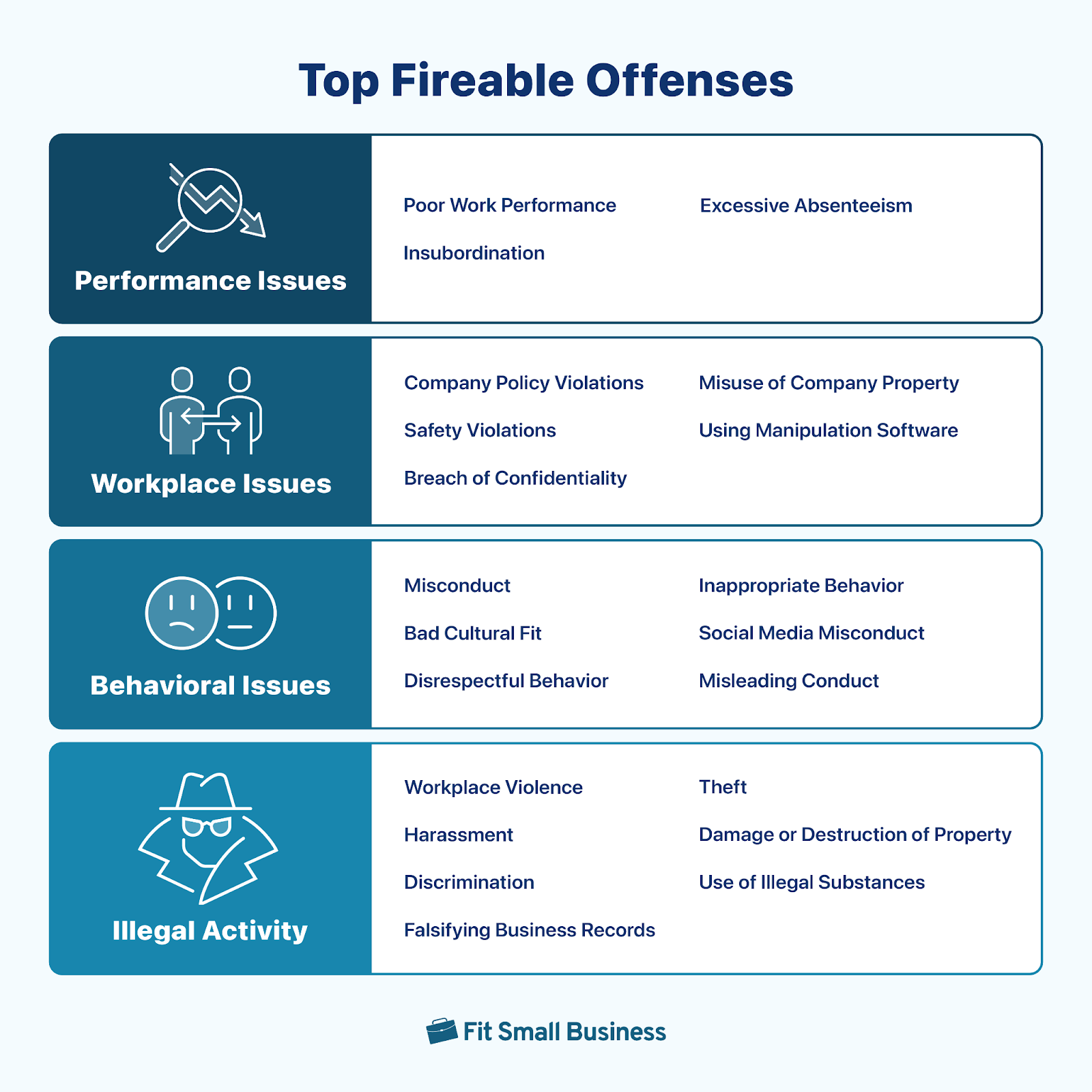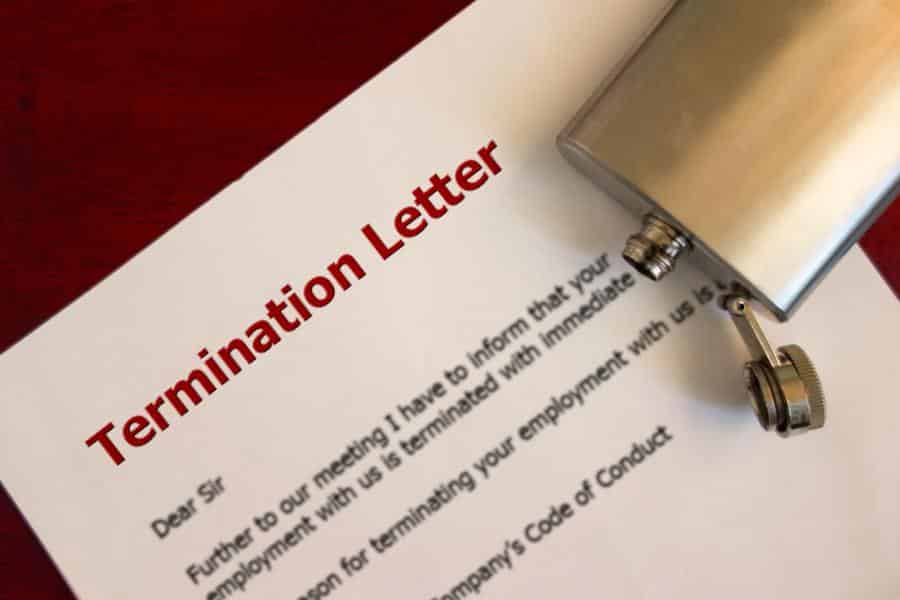A fireable offense is any employee misconduct that results in termination. Employees may be terminated for a variety of fireable offenses, including continual violations of company policies or illegal activities that require immediate dismissal. However, businesses do not need a reason to fire someone, as at-will employment gives small businesses broad authority, so long as the termination isn’t for a discriminatory reason.
Below are the top 21 reasons to fire someone, broken down by category—performance issues, workplace issues, behavioral issues, and illegal activity.

Performance Issues
1. Poor Work Performance
The top fireable offense for an employee’s termination is one that often builds up over time. While an employee could be terminated on the spot, ending the employment relationship for poor work performance is better done through a progressive discipline policy, a key component of your employee management process. By following a discipline policy, when you are ready to terminate an employee for performance issues you will have documentation on hand.
Poor work performance could include repeatedly missing deadlines, failing to meet goals, failing to complete a performance improvement plan (PIP), and many other work performance issues. In certain circumstances, however, an employee’s performance could be so poor and disruptive that it requires immediate termination. It is a fireable offense for an employee to perform poorly at work because it represents an inability to handle the responsibilities of the role.
2. Insubordination
Insubordination occurs when an employee disregards a manager’s instructions. While not always grounds for immediate termination, it certainly is grounds for disciplinary action. If firing an employee is not the route you wish to go, consider implementing a disciplinary action program to correct the behavior. This may include a written warning, suspension, or even termination.
Insubordination can be verbal or physical, and it can occur when an employee refuses to perform a job task, carries out a job task in a way that is not prescribed, or fails to follow company policy. It can also occur when an employee challenges or criticizes an employer’s decision in front of other employees.
When a manager disciplines an employee for insubordination, the conversation can quickly become tense. Managers with stellar people management skills should be able to direct the conversation toward improving the employee’s behavior. If it occurs frequently or disrupts company operations, it may become cause for termination.
3. Excessive Absenteeism
When employees do not show up on time or routinely call out, that creates a snowball effect for the rest of your team, which has to pick up the slack or cover shifts. While verbal or written warnings may address infrequent absences and tardiness, if an employee makes a habit of calling out, then you may have a legitimate reason to terminate them.
Some employees may abuse company policy and take time off when it’s not approved in advance, faking an illness, or simply not coming to work. A single incident might not result in termination, but repeated documented offenses can be grounds for termination.
Depending on your company policies, an employee who does not show up for work for three consecutive days without calling in may be deemed to have abandoned their job. In this case, you could end the employment relationship under your employee attendance policy.
Workplace Issues
4. Company Policy Violations
Your small business took great care to create policies that align with your company core values and ensure that your employees give you efficient and productive work. Part of that includes treating colleagues with respect and adhering to your company standards. When an employee violates your company policies, it puts your business and your company values at risk.
One of the biggest risks associated with employees violating company policy is that it can damage your reputation. If word gets out that employees are violating company policies, it can make potential customers and clients think twice about doing business with you. This can lead to a loss in revenue and could even put you out of business. Additionally, it can create a hostile work environment. If employees are constantly breaking the rules, it can make other employees feel uncomfortable and unsafe. This can lead to high turnover rates and a decrease in productivity.
5. Safety Violations
Some company policies are required because of industry and governmental regulations. In the construction industry, for example, companies might require employees to wear steel-toed shoes. If an employee violates this policy, it could result in disciplinary action—not because the company is looking for a reason to terminate an employee, but because the employee is ignoring safety regulations. If the employee continues to violate the policy and the company has documented the repeated violation, it may have legitimate grounds for termination.
6. Breach of Confidentiality
There is a level of perceived confidentiality in any business, but especially for employees who are privy to sensitive information, such as human resources or accounting. When an employee discloses confidential information to an unauthorized person, whether within your company or outside, this could result in a breach of confidentiality. This may be grounds for termination.
Having a non-disclosure agreement in place can notify employees of the outcomes should they reveal confidential information. These agreements are used to protect sensitive information and maintain the confidentiality of valuable data. Download our free non-disclosure agreement template—we even provide instructions to ensure that your documents have everything you need.
7. Misuse of Company Property
Company property, like computers, should be used for work-related purposes only. Even if you have employees who work remotely and you send them a computer to use, you expect them to use it for business purposes only.
Employees deserve a break during the day, but you can reasonably expect that they will not use the company computer excessively for personal use, especially inappropriate or illegal uses. Your company may have a legitimate reason to terminate an employee if they are using their computer for non-work purposes during working hours.
8. Using Manipulation Software
Some employees, especially remote workers, are finding ways to make it look like they are working, even when they are not. This is a direct violation of company policies and is considered time theft. It is also grounds for immediate termination.
Some common examples include:
- Delivery drivers using wifi and GPS jammers to avoid being located
- Installing software on computers that keep it from going idle
- Attaching tools to the computer mouse to keep it moving
- Manually changing time within a time-tracking system
To circumvent this behavior, consider using employee monitoring software on company-owned computers. This software can track employee movements, take random screenshots, recognize and delete manipulation software, and monitor websites visited.
Behavioral Issues
9. Misconduct
Unethical conduct covers a wide range of employee behavior, from lying and dishonesty to fraud and theft. Employees may neglect their work or even lie to clients. You should not tolerate this type of misconduct.
Misconduct like this is not only detrimental to your business but can demoralize other employees. When they observe unethical employee conduct, small businesses need to take action, which may include dismissal.
10. Bad Cultural Fit
The hiring manager is often focused on the skills of an applicant and fails to ensure that the applicant is aligned with your company culture. Since a small business has fewer employees, a cultural fit is crucial.
To achieve the company’s goals, your employees need to understand them and be willing to work hard for them by being team players. If you have an employee who isn’t finding their groove or aligning with your company culture, it might be time to move on. Despite the difficulty of terminating a new hire, it gets your company closer to finding the right employee.
11. Disrespectful Behavior
For some employees, you can do nothing right, and they’re always having a bad day. They make negative comments in meetings, are disruptive, and try to get other employees to join their negativity. Negativity spreads like wildfire in small businesses, and you must stop it immediately.
An isolated incident may not warrant termination, but repeated and documented instances of disrespect in the workplace can. When it comes to employee discipline, there is a fine line between what warrants a warning and what warrants termination. Employers should always document instances of employee misconduct, regardless of how minor they may seem. This documentation can be used as evidence if an employee needs to be disciplined or terminated in the future.
12. Inappropriate Behavior
When an employee’s behavior crosses the line into inappropriate behavior, it may be time to let the employee go. For example, what appears to be innocent water cooler talk could become disruptive or deemed inappropriate to others listening. Your first course of action should be to call out the inappropriate behavior to the employee and let them know it violates your company policies. If the behavior continues, it would be grounds for termination.
Some common examples include:
- Sexual harassment
- Gossipping
- Offensive humor
- Foul language
- Body exposure
13. Social Media Misconduct
Many people use their social media accounts to vent about their employers. However, this can create a negative image of your business and even result in the sharing of confidential information. While you cannot restrict what your employees post on their social media accounts, their posts can have consequences for their employment.
If your company has a social media policy, it should prohibit employees from disparaging the company or other employees and from releasing confidential information. If an employee violates this policy, you are well within your rights to terminate them.
14. Misleading Conduct
This problem can start even before employment begins—some job applicants lie about their job titles or experience on their resumes. This can result in the hired employee not being able to perform their job duties.
Additionally, employees who lie when confronted with a performance issue can compromise your business. If you are unable to get to the bottom of an issue with an employee, it may be best to terminate them.
Illegal Activity
15. Workplace Violence
Violence at work makes for an especially dangerous situation. Inevitably, we will disagree with our colleagues. A passionate conversation, however, differs greatly from screaming, yelling, or physical violence.
You expect your employees to act professionally and, when they don’t, you need to take prompt action. Whether an employee brings a weapon to work or gets into a physical altercation with another employee, immediate termination should result.
16. Harassment
Harassment in the workplace can come in many forms—sexual harassment, bullying, retaliatory harassment, and more. When an employee engages in harassment of a colleague or someone they supervise, that creates a toxic environment for every employee.
While you don’t have a legal requirement to terminate an employee who engages in harassment, it is probably in your company’s best interest not to delay removing the employee. Ongoing harassment not only creates a dangerous work environment but also opens your company up to employee lawsuits. Consider having policies in place, such as a sexual harassment policy, that outlines disciplinary actions and remains compliant with federal and state laws.
17. Discrimination
Discrimination at work is a serious issue, so much so that the EEOC will fine companies up to $300,000, depending on the size of the business. Whether an employee makes a racial comment or an employee is passed over for promotion because of their age or disability, your business could face steep fines.
Discrimination at work creates a hostile work environment for all employees, not just the direct victims. Promoting an accepting and open culture can discourage this type of behavior. However, if you learn of an employee who is engaging in discrimination of any kind, you must take immediate action, including possible termination.
18. Falsifying Business Records
Employees may be authorized to create and sign company documents. Falsifying these documents, however, creates a risk for your entire organization. It is important to have policies and procedures in place to prevent document fraud.
Document fraud can happen in many ways. Employees may change dates, names, or amounts on documents. They may also change their timesheet or falsify company financial statements to hide stolen funds. This type of fraud can be difficult to detect and it can damage the reputation of the organization and lead to legal problems.
Businesses should take steps to prevent document fraud. Employees should be trained on the importance of honesty and integrity, and policies and procedures should be in place to ensure that documents are accurate. These measures will help protect the organization from fraudulent activity. In extreme cases, falsifying documents could lead to physical injury or death of employees or customers. Immediately terminate an employee who falsifies company documents.
19. Theft
When you hire employees, you should do a background check on them and expect that they will not steal from you. To ensure that it goes smoothly, make sure to have a well-written background check policy in place or hire a background check service to handle it for you—check our roundup of the best background check companies for some options.
Unfortunately, some people don’t always act scrupulously—employee theft can happen, be it on merchandise, cash, or intellectual property. The moment you know an employee has stolen from your company, document the incident and terminate the employee. You may even consider filing a claim against them to recover your losses.
20. Damage or Destruction of Company Property
Along the same lines of violence in the workplace, if an employee deliberately damages or destroys company property, you should consider terminating the employee immediately, depending on the level of destruction.
An accident involving the damage to company property should be documented and depending on the cost involved, include a disciplinary action. However, you likely won’t fire an employee for accidentally damaging property. If the employee deliberately causes damages to your property—ruining computers, breaking office equipment, or disabling security systems, this may be cause for termination.
21. Use of Illegal Substances
When an employee uses illegal substances at work, it can place everyone in danger, including them. It can also cause lost productivity and decrease employee morale. Illegal drug use will justify an immediate termination.
Even using legal drugs at work, like alcohol or marijuana (where legal), could result in the immediate termination of an offending employee. Small businesses have a right and a duty to restrict both legal and illegal drug use at work. Violations of that policy should result in termination.
Fireable Offenses Frequently Asked Questions (FAQs)
An employee may be disqualified from receiving unemployment benefits if they were fired for misconduct, theft, absenteeism, violation of company policies, or insubordination. When you are faced with firing an employee, whether for performance issues, behavioral issues, or illegal activity, it is best to have everything in writing. Collect all documentation that details the events leading up to the firing, such as evaluations, disciplinary reports, and performance documents. This may assist in making an unemployment claim non-chargeable to your company.
Once you have determined you need to let an employee go, it is best to provide the employee with a written letter of termination. If possible, present the written documentation to the employee in person. However, say as little as possible to avoid potential discrimination claims.
Any employee who is conducting illegal activities at your business (or through a shared online community) should be immediately terminated. Such activities include harassment, theft, use of illegal substances, destruction of property, and violence.
Bottom Line
No one enjoys firing other people, but it is often necessary. As long as there is no discrimination against a protected class, employment-at-will gives small businesses a reason to fire someone for any or no reason. Dishonesty, negativity, and illegal activity disrupt your workplace and reduce productivity. To keep your business growing, you must take prompt action, including terminating offending employees.


